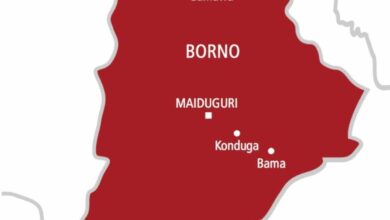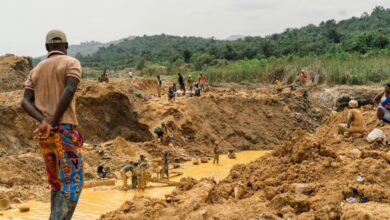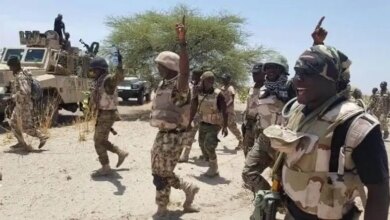Black Stars’ commanding World Cup advance signals national unity and economic hope
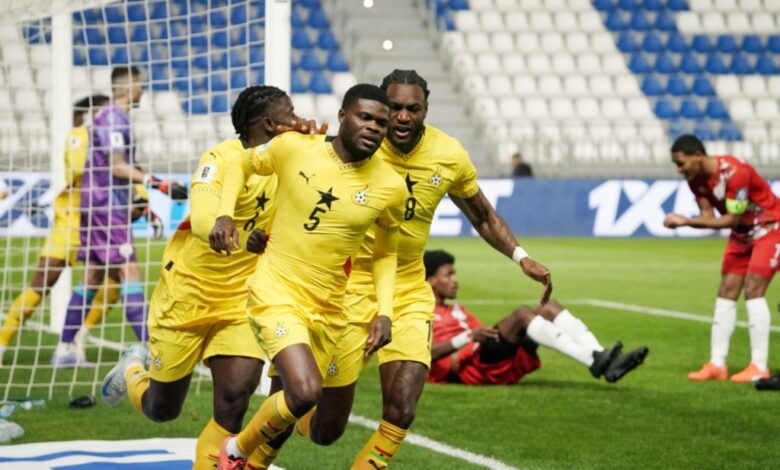
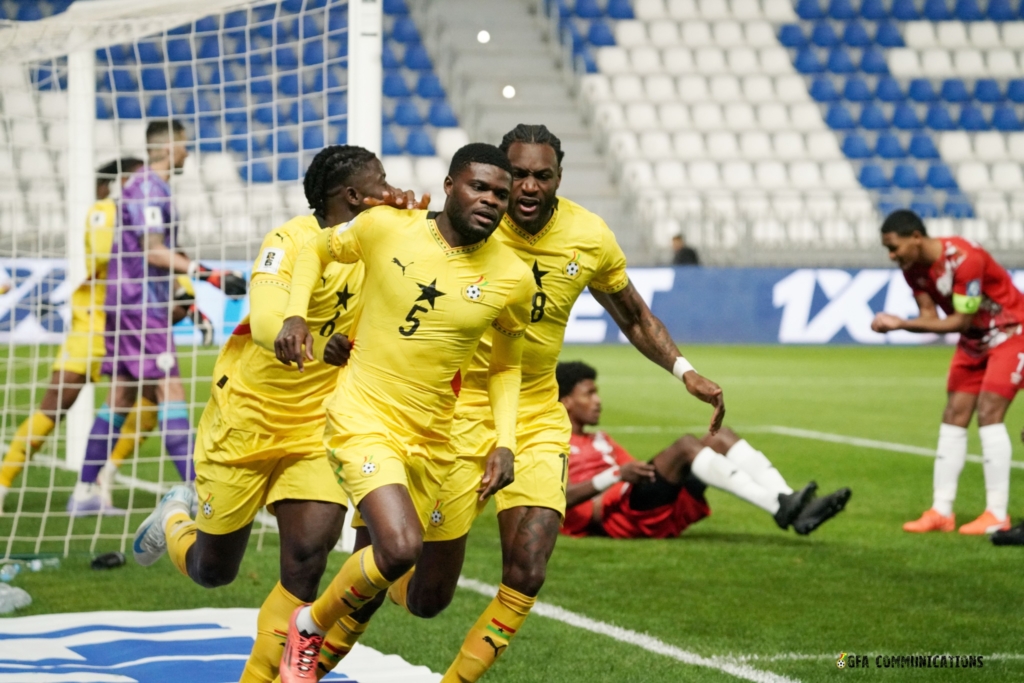
Ghana’s commanding 5-0 victory over the Central African Republic (CAR) on Wednesday, October 8, 2025, has moved the Black Stars to the brink of securing a ticket to the 2026 FIFA World Cup—a watershed moment for the nation and for African football.
This potential fifth qualification for the Black Stars represents far more than a sporting achievement; it is a powerful geopolitical signal of rediscovered national purpose and a crucial economic lifeline.
The victory, secured on Matchday 9 of Group I, highlights the team’s statistical excellence. Assuming all Matchday 9 fixtures in the six-team group have been completed, Ghana’s projected record is 7 wins, 1 draw, and 1 loss, accumulating 22 points.
With 22 goals scored and only 6 conceded (a goal difference of +16), this is a remarkable turnaround from the team’s recent failures.
This commanding form, which saw Ghana enter the decisive clash as group leaders, affirms the team’s motto, “The Black Star Will Shine.”
Qualification Secured: The Decisive Matchday 10 Scenario
Ghana is now virtually assured of the sole direct qualification spot from Group I. The results from Matchday 9 have established an insurmountable advantage over their closest rivals, Madagascar.
- Standings: Following their 5-0 thrashing of CAR, Ghana (22 points, +16 Goal Difference) holds a three-point lead over second-placed Madagascar (19 points, +8 Goal Difference).6
- Final Hurdle: For the decisive Matchday 10 on Sunday, October 12, Ghana hosts Comoros, while Madagascar hosts Mali.
- The Scenario: Ghana secures direct qualification with a win or a draw against Comoros.
- The Tie-Breaker Advantage: Even if Ghana loses and Madagascar wins (tying them both on 22 points), the CAF tie-breaker rules prioritize Overall Goal Difference (GD). Madagascar would need an approximately 8-goal swing in their favor during a single competitive fixture to surpass Ghana’s current +8 GD advantage—a mathematical near-impossibility.
Conclusion: Ghana’s qualification is mathematically secured against all realistic threats due to its overwhelming superiority in the primary tie-breaker.
The Political Dividend and Emotional Outpouring
The impending qualification immediately triggered rapturous, emotional celebrations across Accra, Kumasi, and Sunyani. This outpouring of emotion underscores how sporting success serves as a potent, if fleeting, unifying force in Ghana’s deeply polarized political landscape.
Research has consistently shown that major sporting events “promote unity and esprit de corps among Ghanaians,” momentarily bridging political differences.
The timing is critical, offering a much-needed national morale booster amid persistent domestic economic pressures and public fatigue.
From a political science perspective, the success of the Black Stars presents a classic case of the “diversionary theory” in practice.
Governing elites may leverage a high-performing national team to temporarily redirect public scrutiny away from economic challenges like high inflation.
One expert noted, “The longer the national team stays in the competition, the longer the population is rallied around the flag, shifting pressure from the government.”
The fan reaction captures the dual nature of this success—national pride mixed with economic hope.
Reflecting the optimism among supporters for the team’s continued success and the financial opportunities tied to the World Cup, one excited fan stated: “Every player did well, and then I mean if you are going to keep on doing this, we are going to do much more than this. I’m super excited because I mean it can give for instance an opportunity… to attend the event.”
This excitement culminates in chants for the host nations, blending national pride with personal aspirations of travel and socio-economic opportunity, as evidenced by chants of “USA! USA!! USA!!!” from ecstatic fans after the victory over CAR.
Addo’s Historic Leadership and Data-Driven Depth
Coach Otto Addo, an ex-Ghana international, has solidified his place in history by becoming the first coach to qualify Ghana for two separate FIFA World Cup tournaments (2022 and 2026). His calm, focused leadership is widely credited for the team’s statistical excellence and unity.
The 5-0 scoreline was a testament to the team’s tactical execution and depth. Key goals were scored by Mohammed Salisu (20th minute), Thomas Partey (52nd minute), Alexander Djiku (69th minute), Jordan Ayew (71st minute, assisted by Gideon Mensah), and the final goal by substitute Kamaldeen Sulemana (87th minute), which demonstrated crucial bench strength.
Previously speaking about his coaching philosophy, Addo has consistently emphasized the importance of a collective unit over reliance on individual flair: “We’re looking beyond individuals, and focusing on building a strong team…
Team building is a process that takes time, and it’s not something that happens overnight.” This data-driven, systematic approach has been the hallmark of his success.
Pan-African Resonance and the Race for Nine Tickets
Ghana’s campaign signals a re-emergence among the continent’s elite. The expansion of the World Cup to nine direct places has provided a strong platform for Ghana to showcase its talent, carrying the hopes of the continent.
Ghana moves closer to joining Egypt, who has officially booked its place after Matchday 9 (leading Group A with 23 points), as the second confirmed African nation to secure a direct berth.
The race for the remaining seven automatic spots remains fierce, with powerhouses like Morocco, Tunisia, and Algeria leading their respective groups but not yet mathematically confirmed.
- Group C: This group is the most volatile, with Benin (14 points) and South Africa (14 points) in a tight race, while traditional powerhouse Nigeria faces elimination pressure after a turbulent campaign.
- Group D: Cape Verde is chasing a historic first-ever World Cup appearance, leading their group ahead of continental giant Cameroon.
Economic Windfall and Accountability Challenges
The 2026 qualification guarantees Ghana a significant financial dividend, primarily through FIFA’s revenue sharing and direct prize money. Crucially, it unlocks the lucrative FIFA Club Benefits Programme.
This program has earmarked an unprecedented total fund of $355 million (approximately GHS4.42 billion) for clubs worldwide whose players participate in the qualifiers and the final tournament.
Business analysts estimate the increased international visibility could double the value of major team kit and travel partnerships in the lead-up to 2026.
This sustained exposure is Ghana’s most valuable non-monetary economic asset, boosting tourism, trade, and investment confidence.
However, the fiscal management of the team remains a contentious issue. The government, aiming for transparency and fiscal prudence, had previously directed the Ministry of Sports to demonstrate cost-saving measures, resulting in the budget for the qualifiers being slashed by over $732,000 (approximately GHS9.11 million).
The Ghana Football Association (GFA) must adhere to this precedent of accountability to ensure public funds are not misused.
The Ultimate Test: AFCON, Youth Development, and Legacy
The World Cup qualification provides a critical morale boost, but the nation’s true footballing hunger remains the Africa Cup of Nations (AFCON) trophy, which Ghana has not won since 1982.
The pressure now shifts entirely to translating this World Cup qualification consistency into continental dominance, making the 2027 AFCON campaign the immediate and most potent metric for Addo’s ultimate success.
Beyond simple infrastructure, the true legacy of this success depends on strategic investment in high-performance sports technology and analytics at the youth level. Establishing state-of-the-art training centers will be crucial for developing local talent that can compete at the highest global standards.
The challenge is to marry the current on-field triumph with off-field integrity and foresight. Ghana has earned its place on the global stage; now it must prove it can build a lasting legacy.
–By
Nana Karikari, Senior International Affairs and Political Analyst
DISCLAIMER: The Views, Comments, Opinions, Contributions and Statements made by Readers and Contributors on this platform do not necessarily represent the views or policy of Multimedia Group Limited.
DISCLAIMER: The Views, Comments, Opinions, Contributions and Statements made by Readers and Contributors on this platform do not necessarily represent the views or policy of Multimedia Group Limited.
Source link

